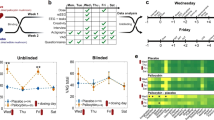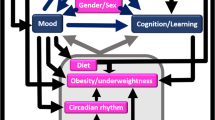Abstract
Background/Objectives:
Only few epidemiologic studies examined sleep characteristics in relation to dietary behaviour. Our aim was to analyse associations of sleep duration, midpoint of sleep and sleep quality with dietary intake among the Bavarian population.
Subjects/Methods:
Within the cross-sectional Bavarian Food Consumption Survey II, 1050 subjects aged 13–81 years were recruited. Dietary intake was assessed with three 24-h dietary recalls by telephone (EPIC-Soft). In our study, 814 participants aged 18 years or older, who completed at least two 24-h dietary recalls and who had complete and plausible information on sleep characteristics were analysed. Dietary intake was described by the consumption of main food groups, energy-proving nutrients and energy intake. Sleep was measured by the Pittsburgh Sleep Quality Index Questionnaire, from which categories of self-reported usual sleep duration in half-h-steps per night, midpoint of sleep and overall sleep quality were derived.
Results:
Sleep duration was associated with intake of non-alcoholic beverages (P<0.01), carbonated beverages (P=0.04), water (P=0.04) and coffee/black tea (P=0.01) with higher intake among short duration sleepers. No association was found between the consumption of other main food groups, energy-proving nutrients or total daily energy intake and sleep duration. Midpoint of sleep was associated with intake of carbonated beverages (P=0.02, highest intake among subjects with early midpoint of sleep). No association between sleep quality and dietary intake was detected.
Conclusions:
Our findings demonstrate only specific associations between sleep characteristics and dietary intake, and mainly sleep duration was associated with beverage intake.
This is a preview of subscription content, access via your institution
Access options
Subscribe to this journal
Receive 12 print issues and online access
$259.00 per year
only $21.58 per issue
Buy this article
- Purchase on Springer Link
- Instant access to full article PDF
Prices may be subject to local taxes which are calculated during checkout
Similar content being viewed by others
References
Choi KM, Lee JS, Park HS, Baik SH, Choi DS, Kim SM . Relationship between sleep duration and the metabolic syndrome: Korean National Health and Nutrition Survey 2001. Int J Obes 2008; 32: 1091–1097.
Xiao Q, Keadle SK, Hollenbeck AR, Matthews CE . Sleep duration and total and cause-specific mortality in a large US cohort: interrelationships with physical activity, sedentary behavior, and body mass index. Am J Epidemiol 2014; 180: 997–1006.
von Ruesten A, Weikert C, Fietze I, Boeing H . Association of sleep duration with chronic diseases in the European Prospective Investigation into Cancer and Nutrition (EPIC)-Potsdam study. PloS One 2012; 7: e30972.
Park SE, Kim HM, Kim DH, Kim J, Cha BS, Kim DJ . The association between sleep duration and general and abdominal obesity in Koreans: data from the Korean National Health and Nutrition Examination Survey, 2001 and 2005. Obesity 2009; 17: 767–771.
Gangwisch JE, Heymsfield SB, Boden-Albala B, Buijs RM, Kreier F, Pickering TG et al. Short sleep duration as a risk factor for hypertension: analyses of the first National Health and Nutrition Examination Survey. Hypertension 2006; 47: 833–839.
Hogenkamp PS, Nilsson E, Nilsson VC, Chapman CD, Vogel H, Lundberg LS et al. Acute sleep deprivation increases portion size and affects food choice in young men. Psychoneuroendocrinology 2013; 38: 1668–1674.
Markwald RR, Melanson EL, Smith MR, Higgins J, Perreault L, Eckel RH et al. Impact of insufficient sleep on total daily energy expenditure, food intake, and weight gain. Proc Natl Acad Sci USA 2013; 110: 5695–5700.
Brondel L, Romer MA, Nougues PM, Touyarou P, Davenne D . Acute partial sleep deprivation increases food intake in healthy men. Am J Clin Nutr 2010; 91: 1550–1559.
St-Onge MP, Roberts AL, Chen J, Kelleman M, O'Keeffe M, RoyChoudhury A et al. Short sleep duration increases energy intakes but does not change energy expenditure in normal-weight individuals. Am J Clin Nutr 2011; 94: 410–416.
Nedeltcheva AV, Kilkus JM, Imperial J, Kasza K, Schoeller DA, Penev PD . Sleep curtailment is accompanied by increased intake of calories from snacks. Am J Clin Nutr 2009; 89: 126–133.
Bosy-Westphal A, Hinrichs S, Jauch-Chara K, Hitze B, Later W, Wilms B et al. Influence of partial sleep deprivation on energy balance and insulin sensitivity in healthy women. Obes Facts 2008; 1: 266–273.
Spiegel K, Tasali E, Penev P, Van Cauter E . Brief communication: sleep curtailment in healthy young men is associated with decreased leptin levels, elevated ghrelin levels, and increased hunger and appetite. Ann Intern Med 2004; 141: 846–850.
Nedeltcheva AV, Kilkus JM, Imperial J, Schoeller DA, Penev PD . Insufficient sleep undermines dietary efforts to reduce adiposity. Ann Intern Med 2010; 153: 435–441.
Kant AK, Graubard BI . Association of self-reported sleep duration with eating behaviors of American adults: NHANES 2005-2010. Am J Clin Nutr 2014; 100: 938–947.
Grandner MA, Jackson N, Gerstner JR, Knutson KL . Dietary nutrients associated with short and long sleep duration. Data from a nationally representative sample. Appetite 2013; 64: 71–80.
Garaulet M, Ortega FB, Ruiz JR, Rey-Lopez JP, Beghin L, Manios Y et al. Short sleep duration is associated with increased obesity markers in European adolescents: effect of physical activity and dietary habits. The HELENA study. Int J Obes 2011; 35: 1308–1317.
Stern JH, Grant AS, Thomson CA, Tinker L, Hale L, Brennan KM et al. Short sleep duration is associated with decreased serum leptin, increased energy intake and decreased diet quality in postmenopausal women. Obesity (Silver Spring) 2014; 22: E55–E61.
Patterson RE, Emond JA, Natarajan L, Wesseling-Perry K, Kolonel LN, Jardack P et al. Short sleep duration is associated with higher energy intake and expenditure among African-American and non-Hispanic white adults. J Nutr 2014; 144: 461–466.
Dashti HS, Scheer FA, Jacques PF, Lamon-Fava S, Ordovas JM . Short sleep duration and dietary intake: epidemiologic evidence, mechanisms, and health implications. Adv Nutr 2015; 6: 648–659.
Sato-Mito N, Sasaki S, Murakami K, Okubo H, Takahashi Y, Shibata S et al. The midpoint of sleep is associated with dietary intake and dietary behavior among young Japanese women. Sleep Med 2011; 12: 289–294.
Sato-Mito N, Shibata S, Sasaki S, Sato K . Dietary intake is associated with human chronotype as assessed by both morningness-eveningness score and preferred midpoint of sleep in young Japanese women. Int J Food Sci Nutr 2011; 62: 525–532.
Katagiri R, Asakura K, Kobayashi S, Suga H, Sasaki S . Low intake of vegetables, high intake of confectionary, and unhealthy eating habits are associated with poor sleep quality among middle-aged female Japanese workers. J Occup Health 2014; 56: 359–368.
Grandner MA, Jackson N, Gerstner JR, Knutson KL . Sleep symptoms associated with intake of specific dietary nutrients. J Sleep Res 2014; 23: 22–34.
Slimani N, Deharveng G, Charrondiere RU, van Kappel AL, Ocke MC, Welch A et al. Structure of the standardized computerized 24- h diet recall interview used as reference method in the 22 centers participating in the EPIC project. European Prospective Investigation into Cancer and Nutrition. Comput Methods Programs Biomed 1999; 58: 251–266.
Slimani N, Ferrari P, Ocke M, Welch A, Boeing H, Liere M et al. Standardization of the 24- hour diet recall calibration method used in the european prospective investigation into cancer and nutrition (EPIC): general concepts and preliminary results. Eur J Clin Nutr 2000; 54: 900–917.
Buysse DJ, Reynolds CF 3rd, Monk TH, Berman SR, Kupfer DJ . The Pittsburgh Sleep Quality Index: a new instrument for psychiatric practice and research. Psychiatry Res 1989; 28: 193–213.
Schofield WN . Predicting basal metabolic rate, new standards and review of previous work. Hum Nutr Clin Nutr 1985; 39 (Suppl 1), 5–41.
Roenneberg T, Kuehnle T, Juda M, Kantermann T, Allebrandt K, Gordijn M et al. Epidemiology of the human circadian clock. Sleep Med Rev 2007; 11: 429–438.
Alnaji A, Law GR, Scott EM . The role of sleep duration in diabetes and glucose control. Proc Nutr Soc 2016; 1–9.
Kowall B, Lehnich AT, Strucksberg KH, Fuhrer D, Erbel R, Jankovic N et al. Associations among sleep disturbances, nocturnal sleep duration, daytime napping, and incident prediabetes and type 2 diabetes: the Heinz Nixdorf Recall Study. Sleep Med 2016; 21: 35–41.
Stelmach-Mardas M, Kleiser C, Uzhova I, Penalvo JL, La Torre G, Palys W et al. Seasonality of food groups and total energy intake: a systematic review and meta-analysis. Eur J Clin Nutr 2016; 70: 700–708.
Acknowledgements
The preparation of this paper was supported by the DEterminants of DIet and Physical ACtivity (DEDIPAC) Knowledge Hub. This work is supported by the Joint Programming Initiative ‘Healthy Diet for a Healthy Life’. The funding agency of this work is the German Federal Ministry of Education and Research. We gratefully acknowledge the cooperation of the study participants as well as the work of all co-workers involved in the sampling of data. The BVS II was financially supported by funds from the Bavarian Ministry of Health and Consumer Protection, and the Kurt Eberhard Bode Foundation. CK is financially supported by the German Federal Ministry of Education and Research, Grant No. 01EA1372C.
Author information
Authors and Affiliations
Corresponding author
Ethics declarations
Competing interests
The authors declare no conflict of interest.
Additional information
Supplementary Information accompanies this paper on European Journal of Clinical Nutrition website
Supplementary information
Rights and permissions
About this article
Cite this article
Kleiser, C., Wawro, N., Stelmach-Mardas, M. et al. Are sleep duration, midpoint of sleep and sleep quality associated with dietary intake among Bavarian adults?. Eur J Clin Nutr 71, 631–637 (2017). https://doi.org/10.1038/ejcn.2016.264
Received:
Revised:
Accepted:
Published:
Issue Date:
DOI: https://doi.org/10.1038/ejcn.2016.264
This article is cited by
-
The relationship between the intake of branched-chain and aromatic amino acids and individuals' sleep quality based on body mass index, gender, and age
Journal of Health, Population and Nutrition (2023)
-
Associations of midpoint of sleep and night sleep duration with type 2 diabetes mellitus in Chinese rural population: the Henan rural cohort study
BMC Public Health (2021)
-
Association between sleep duration and sleep quality with sugar and sugar-sweetened beverages intake among university students
Sleep and Breathing (2021)
-
The relationship between sleep duration, sleep quality and dietary intake in adults
Sleep and Biological Rhythms (2020)
-
Chronotype and sleep duration are associated with stimulant consumption and BMI among Chinese undergraduates
Sleep and Biological Rhythms (2017)



